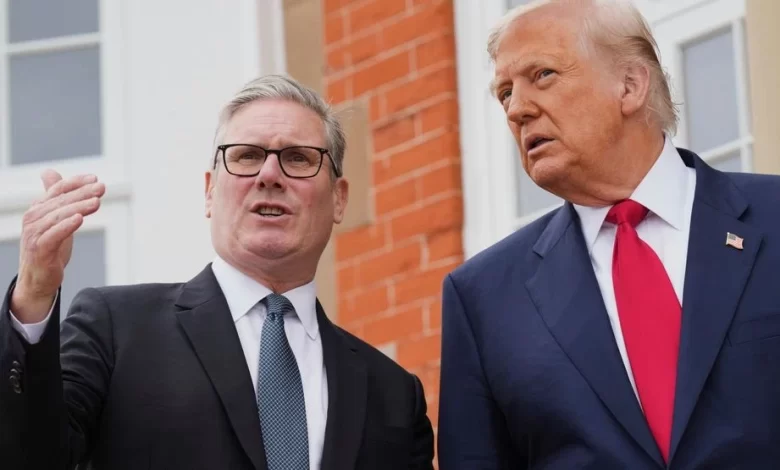
By : Nedal Zubeidi
Jordan Daily – Prime Minister Keir Starmer says the UK is ready to formally recognise a Palestinian state at the United Nations General Assembly this September- joining France, Spain, Ireland, Norway, and a growing bloc of nations who have decided that enough is enough. Recognition, Starmer says, will happen unless Israel takes serious, visible steps: a ceasefire in Gaza, no more annexation talk in the West Bank, and a credible re-engagement with the two-state solution.
Sound familiar? It should. Because this isn’t just about Palestine or Israel anymore. This is about Europe- and now possibly Britain- finally waking up to the dangerous illusion that the Israeli-Palestinian conflict could be “managed” rather than solved.
For decades, the West- in particular the U.S. and its closest allies- have talked about a two-state solution the way people talk about getting in shape or learning a new language. “Important, absolutely. We’ll get around to it… someday.” Meanwhile, settlements expanded, Palestinian institutions weakened, Israel’s far-right grew emboldened, using perpetual conflict as a license to sideline diplomacy and expand settlement policy, and hope was outsourced to another news cycle.
And now the bill is coming due.
Everything changed last week when French President Emmanuel Macron declared that France would recognise Palestine at the UN. That was a diplomatic Shockwave. France is not a fringe player or some sentimental bystander. It’s a permanent Security Council member and the first G7 country to make this move.
Starmer, a lawyer by training and pragmatist by instinct, is more cautious. He’s added conditions. But make no mistake: Britain is aligning itself with a tectonic shift in global diplomacy. A growing number of countries- from Europe to Asia to Latin America- are no longer waiting for Washington to bless Palestinian statehood. They’re acting on their own timelines, not Israel’s.
Even Donald Trump, of all people, gave a kind of half-shrug. Asked this week about Britain’s potential recognition of Palestine, he basically said, “I don’t care.” That’s significant. When Trump doesn’t tweet rage about something, it tells you it’s no longer politically radioactive.
Since the start of the war in Gaza in October 2023, over 60,000 Palestinians have been killed, according to humanitarian agencies. Much of Gaza has been reduced to rubble. The West Bank is boiling. And the international community- particularly in the Global South- is losing patience with a system that gives Israel impunity while asking Palestinians to wait indefinitely for justice.
For many Europeans, the hypocrisy became untenable. How can you defend Ukraine’s territorial sovereignty while greenlighting permanent occupation in the West Bank? How can you call for international law in Kyiv but explain it away in Gaza?
It’s not about picking sides. It’s about upholding rules.
Now, some will say this is all symbolic. That it changes nothing on the ground. I disagree. Symbols matter in international relations- especially when they unlock legal tools and political leverage.
Under the Montevideo Convention of 1933, a state must have a defined territory, a permanent population, a functioning government, and the ability to engage in diplomacy. Palestine ticks all those boxes. And with recognition, its legal status shifts- from a disputed entity to a sovereign peer under international law.
That means greater access to the International Criminal Court. More leverage in negotiations. And most importantly, a psychological shift- from being the subject of someone else’s benevolence to being a recognised actor with rights, responsibilities, and agency.
This scares Netanyahu, and for good reason. He calls recognition “a reward for Hamas.” But let’s be honest: Recognition strengthens the Palestinian Authority, not Hamas. It bolsters those who believe in diplomacy. It gives Palestinians something to vote for- not just protest against.
Josep Borrell, the EU’s former foreign policy chief, put it bluntly: “If we do not fix it now, it may trigger displacement, terrorism, and intercommunity tensions.” Translation: Europe is no longer seeing the Israeli-Palestinian conflict as someone else’s problem. It’s becoming their own.
So here we are. The UK- once the colonial architect of this conflict- is preparing to recognise the very state whose existence it once denied. That’s not just historic. It’s poetic.
There’s an old saying in diplomacy: *Facts on the ground shape the facts in the air*. For too long, the facts on the ground have been moving only in one direction- toward permanent occupation, creeping annexation, and deepening despair.
Recognition of Palestine won’t solve everything. But it changes the air. It alters the conversation. It resets the moral compass.
And sometimes, in diplomacy, that’s how real change begins.

